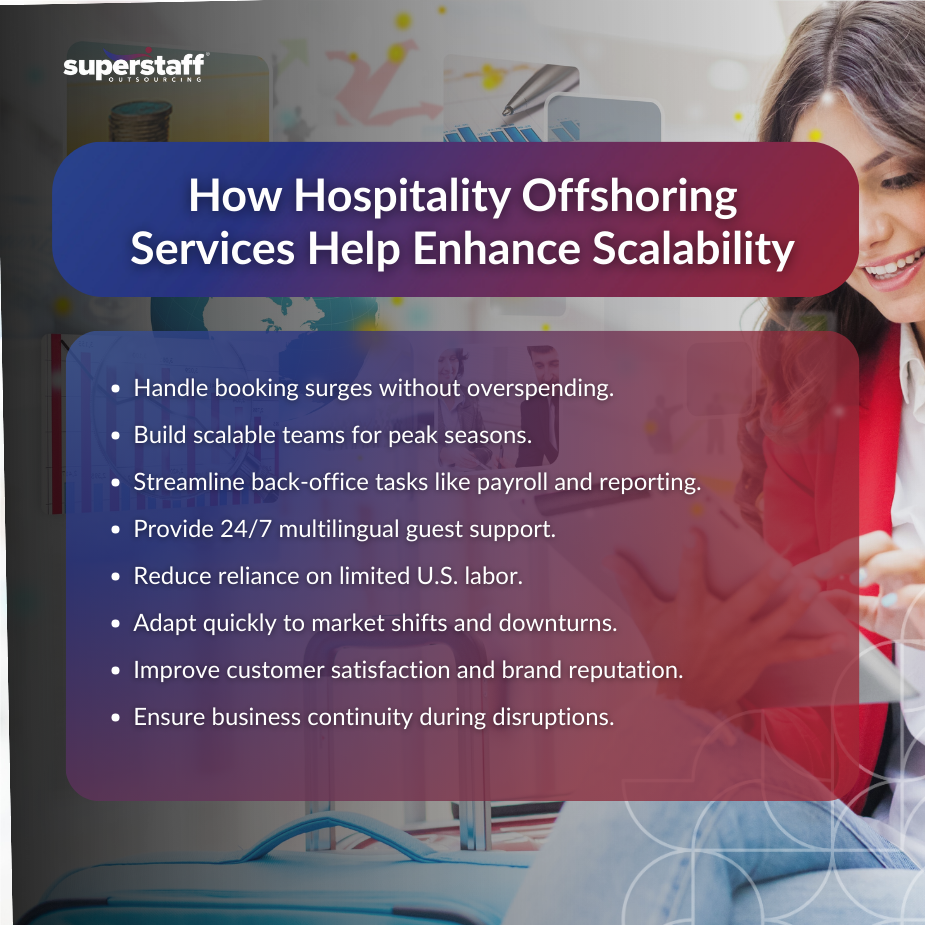
After years of uncertainty, U.S. business travel is back on the rise, reshaping the hospitality industry in significant ways. Hotels, airlines, and travel providers are experiencing a surge in bookings as conferences, corporate events, and face-to-face meetings return in full swing. While this rebound is a positive sign of recovery, it also presents new challenges: fluctuating booking volumes, increased guest expectations, and the need for around-the-clock support.
To keep pace with this demand, hospitality leaders are turning to hospitality offshoring services. By leveraging offshore teams, companies can scale their operations quickly, enhance customer service quality, and reduce overhead costs—all without sacrificing the high-touch experiences that travelers expect. From multilingual support agents to specialized back-office teams, offshoring provides the flexibility and expertise needed to meet rising service demands while maintaining profitability.
This blog explores why offshoring is more than just a cost-saving measure; it’s a strategic advantage. For hospitality firms navigating today’s travel boom, offshoring offers the scalability and resilience required to thrive in an increasingly competitive landscape.
U.S. business travel is rebounding, fueling new challenges for hospitality companies
Recent reports found that, although leisure travel may be declining, business travel has been steadily climbing, with forecasts showing continued growth over the next five years.
Post-pandemic, leisure travel drove much of the early recovery, but today, corporate trips, conventions, and trade shows are now returning in force. Companies are once again investing in face-to-face interactions, recognizing that in-person meetings often lead to stronger client relationships and faster deal-making.
This shift means hospitality providers, such as hotels, resorts, airlines, and event venues, must be ready to deliver at a much larger scale than in the past few years. Yet, challenges loom large:
- Surge in business events and trips: Conferences that were once virtual are back on physical calendars, creating sudden spikes in reservations and service demand.
- Staffing shortages: Many hotels and service companies downsized during the pandemic, and recruiting talent domestically remains difficult amid labor shortages and wage inflation.
- Rising guest expectations: Today’s business travelers expect 24/7 responsiveness, multilingual assistance, and frictionless service experiences.
This fast-changing landscape requires hospitality businesses to rethink scalability strategies. Meeting demand with traditional, domestic-only teams is no longer sustainable. Companies need flexible solutions, such as hospitality offshoring services, that allow them to ramp up capacity quickly, while keeping costs under control.

Offshoring empowers hospitality companies to expand customer service capacity without ballooning costs
In a service-driven industry, customer support is the heartbeat of hospitality. From booking reservations to resolving last-minute itinerary changes, the ability to respond quickly can make or break a guest’s experience. This is where hospitality offshoring services shine.
By outsourcing functions like reservation support, loyalty program management, and guest inquiries, companies can tap into a pool of trained professionals who specialize in hospitality operations. Offshoring transforms the scalability equation:
- Scalable teams for peak seasons: Offshore staffing for hospitality allows companies to quickly scale up support teams during busy travel seasons and scale down when demand levels off. This flexibility prevents overstaffing and reduces burnout among in-house employees.
- Cost-effective labor markets: Offshoring operations to regions like the Philippines or Colombia provides significant savings compared to hiring and retaining staff in the U.S. These savings can be reinvested in improving facilities, technology, or guest perks.
- Hospitality-trained CX specialists: Offshore agents are not generic call center workers—they are trained in the nuances of hospitality, understanding how to handle VIP travelers, business accounts, and loyalty programs with professionalism.
Beyond cost advantages, offshoring helps brands maintain consistent service quality even during high-demand surges. This consistency strengthens guest trust and builds long-term loyalty.
But the benefits of offshoring extend beyond front-line customer support. Behind-the-scenes operations also play a vital role in sustaining service excellence.
Back-office offshoring ensures operational continuity behind the scenes
While guests interact with the front lines of hospitality, back-office teams quietly keep everything running. Unfortunately, many hospitality providers struggle with administrative bottlenecks that slow down efficiency. Here, hospitality BPO solutions prove invaluable.
By outsourcing administrative and financial functions, companies can streamline operations and reduce internal burdens:
- Payroll, invoicing, and expense management: Offshore finance teams can ensure accurate, timely processing, freeing U.S. staff to focus on guest-facing roles.
- Data entry, reporting, and compliance monitoring: Offshoring ensures that the growing data flow generated by bookings, travel records, and guest feedback is managed systematically.
- Vendor and travel partner coordination: Offshore teams can manage logistics and communications with vendors, airlines, and event organizers, ensuring smooth execution of complex itineraries.
These efficiencies create ripple effects across the organization. When back-office tasks are managed reliably offshore, hospitality firms can focus resources on elevating guest experiences, developing loyalty programs, and innovating service offerings.
Back-office operations are just one piece of the puzzle. Another critical area where offshoring delivers value is in bridging the language gap for global travelers.
Multilingual offshore teams help hospitality brands serve global travelers seamlessly
Business travel today is inherently global. Executives fly across continents for meetings, and multinational corporations expect consistent service wherever their employees go. Language and cultural barriers, however, can create friction. This is why multilingual offshore teams are becoming indispensable for hospitality firms.
Through hospitality offshoring services, companies can access multilingual agents fluent in English, Spanish, Mandarin, and other key languages. These teams provide:
- Real-time multilingual support: Call centers can assist international guests in their preferred language, reducing misunderstandings and improving satisfaction.
- Cultural alignment: Offshore teams from diverse regions often bring cultural fluency that helps them empathize with and adapt to guest expectations.
- Enhanced brand reputation: Companies that provide seamless multilingual service gain a competitive edge, especially with corporate accounts managing international travel.
By addressing language diversity through offshore staffing for hospitality, brands not only improve the guest experience but also build credibility among global partners.
In addition to enhancing customer satisfaction, offshoring strengthens companies’ ability to withstand market volatility.
Offshore scalability creates resilience against market volatility
The hospitality sector is inherently cyclical. Demand can fluctuate dramatically depending on the season, the economy, or unexpected disruptions such as natural disasters or pandemics. Relying solely on local labor pools leaves companies vulnerable to these shifts.
Hospitality offshoring services provide a buffer by offering flexible scalability and cost control:
- Quick adaptation to peaks and downturns: Offshore staffing models allow companies to add or reduce capacity almost instantly, avoiding the costs and complexities of hiring locally.
- Reduced reliance on strained labor markets: U.S. service industries continue to face shortages. Offshore teams provide a reliable alternative, ensuring consistent operations even when local hiring is difficult.
- Business continuity in uncertain times: By diversifying operations geographically, hospitality firms safeguard against localized disruptions, creating resilience that domestic-only operations cannot match.
These advantages make hospitality BPO solutions not just a cost-saving measure, but a long-term strategic pillar for growth and stability.
Keep Up With Rising Travel Demand Through Hospitality Offshoring Services
The rise in U.S. business travel represents a massive growth opportunity for the hospitality sector. But with opportunity comes pressure—higher booking volumes, greater service demands, and rising guest expectations. For companies to keep pace, traditional staffing models are no longer enough.
Through hospitality offshoring services, providers can scale quickly, deliver multilingual customer support, streamline back-office operations, and remain agile amid volatility. Offshore staffing for hospitality is more than a tactical fix; it is a strategic advantage that ensures resilience, efficiency, and world-class service delivery.
In short, how hospitality companies enhance scalability through offshoring lies in embracing flexible, cost-effective, and expertise-driven solutions. The brands that leverage these advantages will not only thrive in today’s travel boom but will also build the foundations for sustainable growth in the years ahead.
Hospitality companies ready to meet rising travel demand without compromising quality can partner with SuperStaff. With proven expertise in hospitality BPO solutions, SuperStaff builds offshore teams that deliver consistency, flexibility, and exceptional service—helping your brand turn the travel rebound into lasting success.






